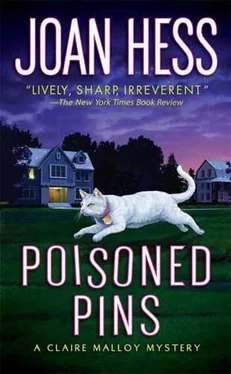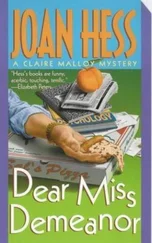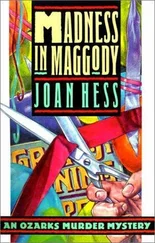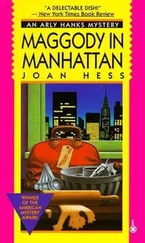Joan Hess - Poisoned Pins
Здесь есть возможность читать онлайн «Joan Hess - Poisoned Pins» весь текст электронной книги совершенно бесплатно (целиком полную версию без сокращений). В некоторых случаях можно слушать аудио, скачать через торрент в формате fb2 и присутствует краткое содержание. Жанр: Детектив, на английском языке. Описание произведения, (предисловие) а так же отзывы посетителей доступны на портале библиотеки ЛибКат.
- Название:Poisoned Pins
- Автор:
- Жанр:
- Год:неизвестен
- ISBN:нет данных
- Рейтинг книги:3 / 5. Голосов: 1
-
Избранное:Добавить в избранное
- Отзывы:
-
Ваша оценка:
- 60
- 1
- 2
- 3
- 4
- 5
Poisoned Pins: краткое содержание, описание и аннотация
Предлагаем к чтению аннотацию, описание, краткое содержание или предисловие (зависит от того, что написал сам автор книги «Poisoned Pins»). Если вы не нашли необходимую информацию о книге — напишите в комментариях, мы постараемся отыскать её.
Poisoned Pins — читать онлайн бесплатно полную книгу (весь текст) целиком
Ниже представлен текст книги, разбитый по страницам. Система сохранения места последней прочитанной страницы, позволяет с удобством читать онлайн бесплатно книгу «Poisoned Pins», без необходимости каждый раз заново искать на чём Вы остановились. Поставьте закладку, и сможете в любой момент перейти на страницу, на которой закончили чтение.
Интервал:
Закладка:
After I’d grown bored listening to the dial tone, I replaced the receiver and tried to make sense of the conversation. Unless Debbie Anne was terrified by the possibility of being haunted by a diaphanous, chain-rattling law student, she wasn’t aware that Jean was dead. On the contrary, she was worried about being locked up “tighter’n bark on a tree” (the quaint phrase did not refer, presumably, to a birch tree) because of something Jean might accuse her of doing, or of having done, or of planning to do in the future. Whatever it was would result in incarceration until Jean admitted her guilt, at which time Debbie Anne would be vindicated.
I knew Debbie Anne’s parents had been contacted by the police, but I’d promised to call them and I was a bit curious about their reaction. No one answered, nor did a mechanized voice suggest I leave a message at the sound of the beep. Resolving to remember to try later, I tucked the piece of paper with the number into my pocket.
The police were not usually brought in on cases in which the perpetrator shared the secret whistle with someone outside the sisterhood. Surely Debbie Anne knew that, I told myself as I dialed Peters office number. He was out, I was informed by a woman with a chilly voice, who subsequently declined to share the details of his destination or his estimated time of return. I left a message for him to call, waited the rest of the afternoon for him to do so, periodically tried Debbie Anne’s home number with no success, and locked the store at seven.
I hesitated under the portico that had once protected ladies with bustles from rain when they’d debarked from the train and waited for their carriages. These days the ladies tended to wear jeans and T-shirts, and rarely bustled. Nor, frankly, did I, even during prosperous times when I could afford such behavior
The beer garden was too rowdy for my taste on Saturday evenings, and my apartment was apt to be occupied by a teenaged tragedienne who’d had all afternoon to drape the living room in black crepe and polish her performance for the final act. Unwilling to be subjected to it, I walked up the hill to Luanne’s store to see if I could interest her in fajitas, cheese dip, and speculation.
The “closed” sign hung on the inside of the door, and the windows of her apartment above the store were dark. I couldn’t remember if Luanne had mentioned plans for the evening, but it didn’t much matter As I stood on the sidewalk, hands on my hips, frowning at my undeniably comely reflection while I debated what to do, I felt a twinge of sympathy for Debbie Anne Wray. How many nights had she been in the mood for food and chatter, only to be rebuffed by her so-called sisters? She had no place else to go, no one else on whom to rely.
I had my apartment, but I would be forced to listen to Caron’s insufferable whines. The Book Depot was bleak and inhospitable after dark, inclined to creak as if trains of bygone days were racing by to the next abandoned station. If Peter were home, we could cuddle on the sofa and watch inane movies, but he might be occupied until all hours. It occurred to me that I’d insulated myself too well, and my insistence on self-reliance would reduce me to a half order of fajitas.
“Ho, Mrs. Malloy,” called a familiar voice as a bicycle sailed down the sidewalk on what I felt was a collision course.
I shrank into the doorway and fluttered my fingers at my science fiction hippie. In honor of the weekend, he’d combed the crumbs out of his wispy beard and tied his ponytail with a relatively clean shoelace. His blue workshirt was unsoiled, if also unironed. He braked in front of me and put a foot down to steady himself.
“You ever find that copy of Bimbos?” he asked. Behind the smudged lenses of his glasses, his eyes sparkled, either from friendliness or from the recent inhalation of an illicit substance.
“No, but I ordered one for you, and it should be here next week. Would you like to join me for fajitas and beer? My treat, naturally.”
“Is this like a date?”
“This is like a dinner” I said firmly, although inwardly
I was quivering like an adolescent at a junior high dance.
I was on the verge of withdrawing my offer and scurrying away when he nodded, and shortly thereafter I was perched on the back of his bike and we were zooming down the sidewalk.
Several hours later I emerged from the restaurant, satiated not only with food and beer but also with a heady conversation about the manuscript he was writing, well over a thousand pages already and still in the germinal stages of its plot. It was an alternative history that concerned the impact on our modern culture had Napoleon refused to us (as in U.S.) the eight-hundred-odd-thousand square miles known as the Louisiana Territory.
I was pondering the convolutions of Nebras qué as I approached the Kappa Theta Eta house. It looked innocent, as if the tragedy of the previous evening had never taken place. Lights were on in the front room, and in Winkie’s suite. With Debbie Anne still in hiding, only three occupants were left: Winkie, Pippa, and Rebecca. Pippa was threatening to leave for the summer, which meant Eleanor Vanderson might decide to close the house. For her, a coup d’autorité , for me, a coup d’éclat .
I may have been smiling complacently when I saw a tiny light in a third-floor window. It blinked out, but after a moment, it appeared in another window, illuminating a construction-paper cat on the wall for a brief moment, and then again blinked out. I tried to convince myself I’d had one fajita too many, but when I spotted the light in yet a third room, I dismissed the heresy.
Someone was prowling on the third floor, moving through the rooms at the front of the house, apparently unimpeded by locks. And doing so stealthily, in that a person with a legitimate presence would find it more expedient to switch on the ceiling light fixture rather than risk stubbed toes and bruised shins.
I had no idea what to do. I was barely able to prevent myself from clasping my hands together and fluttering my eyelashes in the timeless tradition of gothic heroines. I had options, but racing upstairs to confront the prowler was not high on the list. There were three people living in the house; one of them might have been doing some sort of ritualistic room check, as required by National. Or Debbie Anne might have been hiding up there since the previous night, I told myself slowly. The police had been told no one currently lived on the second or third floor, and therefore might have searched in a perfunctory manner, ascertaining only that lights were off and doors were locked. If she’d hidden until they left, she could be staying in her old bedroom and using the communal pay telephone in the hall. And creeping from room to room in search of clean towels or pink paper cats.
As I congratulated myself on the theory, a face appeared in a window. It was not Debbie Anne Wray, unless she’d shaved her head and put wadded cotton in her cheeks. I wasn’t completely sure, but the man bore a remarkable resemblance to the one who’d driven up to the house the previous evening, parked for a minute, and left. He jerked away from the window so abruptly that I assumed he’d seen me staring at him from the sidewalk.
I forced myself to shrug and stroll toward my apartment, seemingly unconcerned by his presence on the third floor I was unable to whistle, but I made every effort to look as if I might at any moment. Only when I was in the foyer of my duplex did I go storming up the stairs, gasping in a most unattractive fashion. I pounded on the front door and yelled, “Caron! It’s an emergency! Hurry up!”
I’d dumped the contents of my purse on the floor and was pawing through the litter for my key when the door opened. “Mother,” Caron said, her lip curled in distaste, “what on earth are you doing?”
Читать дальшеИнтервал:
Закладка:
Похожие книги на «Poisoned Pins»
Представляем Вашему вниманию похожие книги на «Poisoned Pins» списком для выбора. Мы отобрали схожую по названию и смыслу литературу в надежде предоставить читателям больше вариантов отыскать новые, интересные, ещё непрочитанные произведения.
Обсуждение, отзывы о книге «Poisoned Pins» и просто собственные мнения читателей. Оставьте ваши комментарии, напишите, что Вы думаете о произведении, его смысле или главных героях. Укажите что конкретно понравилось, а что нет, и почему Вы так считаете.












